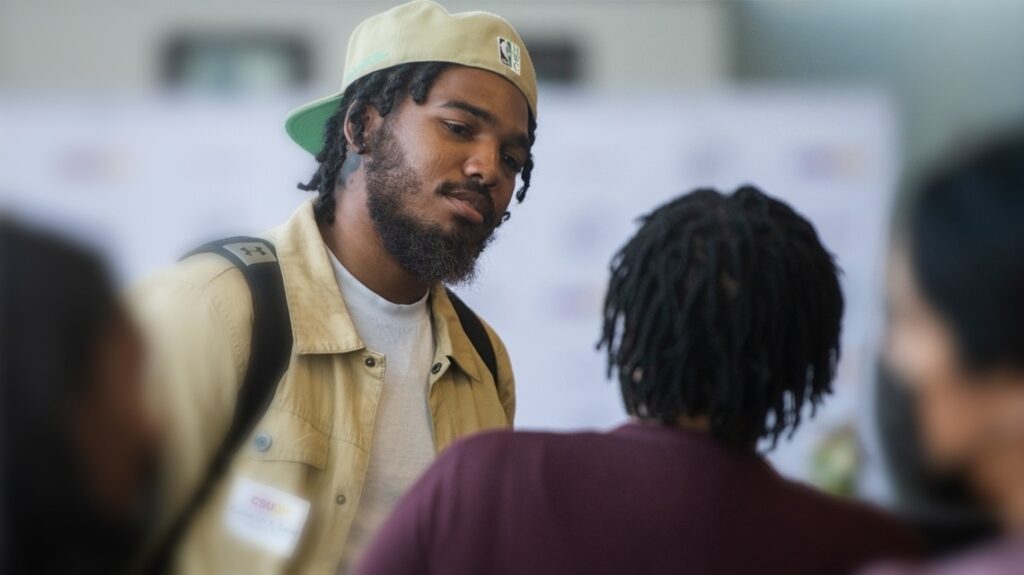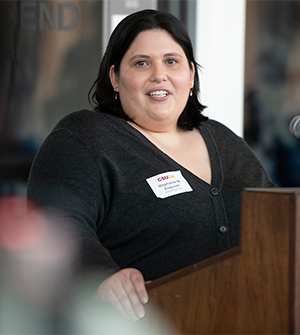Returning Toros Get Fresh Start on Graduation

Stephanie Esquivel enrolled at CSUDH in 2007 straight out of high school. She remembers the excitement she felt as a first-generation college student, eager to graduate and make a positive impact on the lives of others.
However, her optimism soon gave way to an overwhelming sense of displacement.
“I remember feeling lonely, undeserving, and even guilty for abandoning my family to focus on my own goals,” she said. “I stopped attending classes and quickly found myself in a downward spiral.”
Esquivel never completely lost the ambition that initially inspired her. Through fifteen years of personal and economic challenges, she took classes when she could at several community colleges, including a short stint at Arizona State University that allowed her to be closer to her family.
Now she is back on campus and starting her junior year as part of the first cohort of CSUDH’s Once a Toro, Always a Toro program.
Launched earlier this year, the program supports the California State University (CSU) Graduation Initiative 2025 and removes many of the barriers that prevent students who stop out of college from re-enrolling.
In addition to simplifying the process for reenrollment and waving application fees, CSUDH has mobilized advisors and tutors to smooth the transition back into academic life.
“We created a high-touch reengagement campaign with the goal of creating a sense of belonging to former CSUDH students,” explained Sabrina Sanders, director of the Toro Reengagement Program, who oversees the Once a Toro initiative.
Some 3,500 former Toros that stopped out of college in the last five years were invited to return this fall semester. About 390 answered the call, including many like Esquivel whose college dreams have remained unfulfilled for more than a decade.
President Thomas A. Parham formally welcomed the returning Toros during a reception on Sept. 14. He acknowledged that life can often get in the way of even the strongest aspirations, but that CSUDH will always be there to support them.
“I want to say how proud I am of you for accepting our invitation to come back home, because this really is your home,” Parham said. “We are not about to let you fail. You are not on this journey alone.”

A report on enrollment for the academic year 2020-21 nationwide found that 39 million Americans had received some college credit but stopped out before getting a degree. California was among four states that accounted for a third of all such students, more than half of whom come from African American, Latinx, or other underrepresented communities.
The educational non-profit group California Competes identifies this community as “potential graduates” and notes in a report last year titled Untapped Opportunity that the state has about 6.8 million former students aged 25-54.
Among the report’s key findings was the fact that Californians of color represent most of the state’s potential graduates, and that improving educational access would not only increase social mobility but help meet the state’s growing demand for skilled and degreed workers.
“California is preparing the next generation for the jobs of the future,” Gov. Gavin Newsom said last month during the launch of his new $54 million K-16 Education Collaboratives Grant Program. “We’re closing equity gaps, providing more resources to help our students achieve their career goals right in their own communities, and streamlining the pipeline from K-12 to higher education to careers.”
In his address at the reception, CSUDH Provost Michael Spagna concluded by commenting on how committed the university is to educational equity and mobility for students of color. “That’s what Dominguez Hills is all about. Social mobility is the equity issue of our generation,” Spagna said.
For Esquivel, returning to CSUDH is about finishing what she started. It has given her a new sense of purpose and a desire to give back. She is just two years shy of her degree in child development. Law school is next. After that, she wants to create a non-profit organization to mentor girls and young women in underresourced communities in Los Angeles.
“It is only through programs such as Once a Toro, Always a Toro that our deepest need is met – to feel a sense of belonging, acceptance, and the ability to contribute our own voices and experiences to create opportunities for generations to come,” she said.
Latest News
- Famed Writer Delivers a Lesson in Courage, Calls for New Voices to RiseJ. Michael Straczynski doesn’t much care for rules. As a student at San Diego State University, he risked expulsion by bluffing his way into two writing courses taught by celebrated writer and educator Norman Corwin. Straczynski didn’t get expelled, and Corwin became a lifelong friend and cherished mentor. But he understood the risks, and therein […]
- CSUDH Professor Uncovers Secrets About Snake EvolutionAfter almost a decade studying and researching the evolution of snakes, CSUDH Biology Professor Sonal Singhal has come to one undeniable conclusion. “Snakes are so cool!” Since 2014, Singhal has been one of the leaders of a project attempting to discover why snakes have been so successful in evolving traits that allow them to survive […]
- ABC News: Who Guards the Guards? Alumna Shares Her StorySource: ABC News (Video) ABC News’ Linsey Davis investigates more than 2,500 claims of abuse at juvenile probation facilities. Oversight officials say the system is broken beyond repair — and children are in danger. CSUDH alumna Dominique Anderson (B.S. ’22) is one of the women interviewed in this report, which also includes footage of the […]
- CSUDH Alum Performs with Her Students at Carnegie HallToro alumna and high school music teacher Amanda Chavez never imagined that someday she’d be conducting on the stage of Carnegie Hall. But on March 12, that’s exactly what she did, marking her and her students’ debut in the illustrious New York City venue. Chavez and 55 of her students had been invited to perform […]
- Centering Equity in Going Far Together (GFT): Newest UpdatesThe CSUDH Strategic Plan, Going Far Together, consists of five pillars: (1) Thriving Educators, (2) Thriving Students, (3) Culture of Care, (4) Equitable Access, and (5) Pillar of the Community. Since the Strategic Plan’s launch in March 2022, the Strategic Plan Pillar Work Groups have been hard at work, striving to meet the goals and […]
- CSUDH Theatre Performance: “The 25th Annual Putnam County Spelling Bee”What: The 25th Annual Putnam County Spelling Bee by Rachel Sheinkin, William FinnWhen: May 1-4 at 7:00 p.m. and May 3 at 1:00 p.m.Where: University TheatreTickets: $10 for students and $15 for General Admission. To reserve a ticket, visit www.csudh.edu/theatre-arts/buy-tickets/.Contact: Call the CSUDH Performing Arts Department at (310) 243-3589, or email PerformingArts@csudh.edu. The CSUDH Department of Theatre and Dance presents The 25th […]


